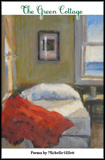Review by Claire Keyes
The Ledge Press
40 Maple Ave
Bellport, NY 11713
2010, 29 pp., $8.00
http://www.theledgemagazine.com
The Green Cottage of Michelle Gillett’s chapbook appears to be an actual place that has gotten passed down to the poet’s generation. It stands for continuity but also as a place for closer connection to the natural world (“Vespids,” “Not there,” “Dead Man’s Float”). “Love Poem 137” depicts the green cottage as a place where the loved one waits. Michelle Gillett casts a wider net with her central metaphor; the green cottage is a place where memory coheres—not just personal or familial but memories that haunt the 20th century including the depredations of World War II. With her ability to marry the lyrical with the political, Gillett challenges her readers to open themselves to themes of death and dying, to a sense of time passing and the inevitable loss of loved ones, but also to sustaining love for other humans and the natural world.
For all the seriousness of her themes, Gillett has a delicate, lyric sensibility. Experiment with reading the opening poem of this collection out loud to yourself. Let its music play over your senses. Don’t hurry after meaning. It’s there in the hands of a poet for whom the lyric still matters. “Vespids” opens with the line: “It’s down/ The hornets’ nest.” Clearly, this is a destruction not to be mourned:
Now first sting of frost on the ground
And we see no threat
only the hollow where harm lived.
Everything the season has housed has flown.
How interesting that she employs “sting” in connection with the frost, at the same time calling up the hornets. “Ground” chimes nicely with “down” just as “first” and “Frost” create a different tone. Similarly the alliterative “hollow,” “harm” and “has housed” give us language chosen for maximum immediacy and music.
The center of the poem makes a leap back in time “when we were children” and recalls childhood exuberance “rising over the roofs not like souls/ detached from bodies, but as bodies/ resisting the world.” The final lines of the poem temper that exuberance by returning to the hornets’ nest and its removal:
Light in my hands
when I lifted it from the eave, forever gone,
no longer wadded in industry, this testament
to vanishing is too fragile to hold.
The nest as a “testament to vanishing” brings the poem back to a more mature understanding of the world. Everything passes; nobody can “resist the world.” But how tender the poem is, how aware of the fragility of life.
In “Documentary,” Gillett strikes a tough pose that only belies the tenderness underneath. The scene is a nightmare from the Holocaust, the voice a disinterested observer:
Why waste bullets on children
when they will suffocate under the weight
of bodies heavy as doors?
The rest of the poem concerns itself with the children who live in the nearby village. They have to “drum on saucepans/ to drown out the sounds” of the mass murders. One of the child-victims survives this horror and “is in her seventies now, smiling for the camera/ against a back-drop of oaks.” The poem concludes with two sentences from this woman:
I remember the sun was shining.
I remember holding onto the roots.
How does one survive the horrors of war? The answer lies in the act of “holding on to the roots.” Literally, the child grabbed onto what was available and solid. As metaphor, her action is more resonant and stands for not giving up, for being active and resistant. The sun, shining down on the scene, is indifferent. “The green cottage” might be an escape from the world, a place of restoration and revival—boating on the lake, swimming with one’s sisters. But the world’s ugliness and cruelty intrude—at least to a poet as conscious and aware as Michelle Gillett.
She does not, however, despair. “Barred Owl,” the penultimate poem in the chapbook is typical of the nature poems in this collection, presenting the bird as in communication with the humans “asleep in the cottage.” Aware of the humans, the barred owl leaves “packets of mouse and finch” for them. He is a bird of prey, after all, and he “stalks the smallest shadows”:
He swallows
them whole the way you tried
to swallow grief, father, mother
dying in turn and after them, the sister who
asked for songs. All night rubbing her back,
half-remembering words to Night and Day, Blue Moon.
Forging a link between herself and the bird, the poet calls up grief she “tried to swallow” in mourning the deaths of family members, with the implication that she didn’t succeed. More grief must come, and with it the necessary music to soothe her soul. The music takes shape in the repetition of the “s” sounds in “whole” and “swallow,” the “sister who asked for songs.” The connection between the poet and the barred owl can only go so far: “His repeated notes trouble your soul–/ you who are nothing but gristle and gut, / cannot thrive on darkness.” In fact, Michelle Gillett has made it clear in the poems of this volume that she prefers “the light that stirs me awake,” and that she has developed her own “vocabulary for vision: angle, focus, light.”
The Green Cottage offers us a refuge and the opportunity to reconnect with the natural world. At the same time, Michelle Gillett’s poems resist the idea that there is any escape from reality.
Comments are closed.